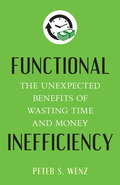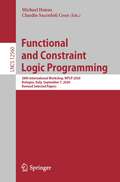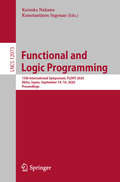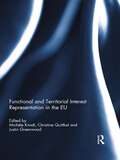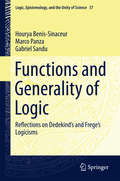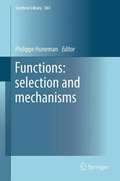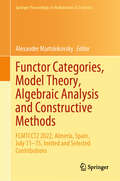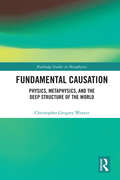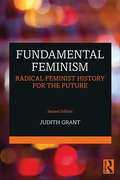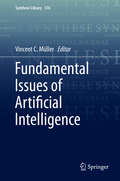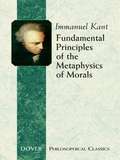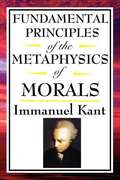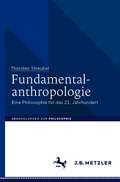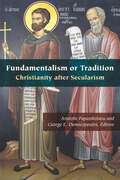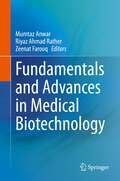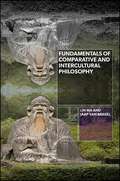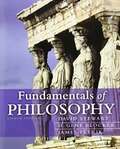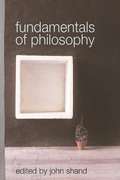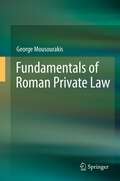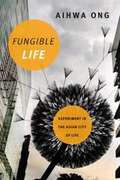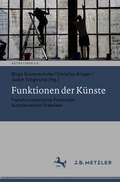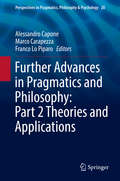- Table View
- List View
Functional Inefficiency
by Peter S. WenzHow can we reduce unemployment? As this insightful and counterintuitive book shows, the surprising answer is inefficiency. Some of the most labor-intensive sectors of the economy, the author notes, are also the most inefficient. But this inefficiency is functional--rather than impairing the economy, it bolsters employment and fosters economic growth.Technological progress increases efficiency and reduces the need for workers in manufacturing, mining, agriculture, and many services. So how do we keep people working? By maintaining inefficiencies in other areas, such as in our systems of transportation and healthcare. The author documents the waste of time and money in hospital systems, the insurance and pharmaceutical industries, automotive travel, and road construction and maintenance. These inefficiencies are tolerated because they provide a lot of jobs and promote economic growth, making them functional inefficiencies.Some of these inefficient systems come with added environmental and health costs, meaning we sacrifice more than simple efficiency for the sake of jobs. Our inefficiencies may be functional, argues Peter Wenz, but they are too often harmful for us as well.The good news is that most of these inefficiencies can be reduced without increasing unemployment or impairing economic growth. Wenz explores different methods of combating unemployment, evaluating each method carefully to determine its basic efficiencies and inefficiencies, as well as its impact on human wellbeing and on the environment. He also assesses whether it is culturally and politically acceptable and actually serves to reduce unemployment. Some inefficiency will remain, he concludes, but its negative impacts can be lessened through increased investment in physical and human infrastructure.Functional Inefficiency offers a wealth of details and a unique analysis of our economic system, plus hope for our future prospects through reduced inefficiency.From the Hardcover edition.
Functional and Constraint Logic Programming: 28th International Workshop, WFLP 2020, Bologna, Italy, September 7, 2020, Revised Selected Papers (Lecture Notes in Computer Science #12560)
by Michael Hanus Claudio Sacerdoti CoenThis book constitutes the refereed post-conference proceedings of the 28th International Workshop on Functional and Constraint Logic Programming, WFLP 2020, held in Bologna, Italy, in September 2020.Due to the COVID-19, the workshop was held online. From the 19 full papers submitted, 8 were accepted for presentation at the workshop. The accepted papers cover different programming areas of functional and logic programming, including code generation, verification, and debugging.
Functional and Logic Programming: 15th International Symposium, FLOPS 2020, Akita, Japan, September 14–16, 2020, Proceedings (Lecture Notes in Computer Science #12073)
by Keisuke Nakano Konstantinos SagonasThis book constitutes the proceedings of the 15th International Symposium on Functional and Logic Programming, FLOPS 2020, held in Akita, Japan*, in September 2020. The 12 papers presented in this volume were carefully reviewed and selected from 25 submissions. They cover all aspects of the design, semantics, theory, applications, implementations, and teaching of declarative programming focusing on topics such as functional programming, logic programming, declarative programming, constraint programming, formal method, model checking, program transformation, program refinement, and type theory. *The conference was held virtually due to the COVID-19 pandemic.
Functional and Territorial Interest Representation in the EU (Journal Of European Integration Special Issues Ser.)
by Justin Greenwood Christine Quittkat MichDespite a substantial legacy of literature on EU interest representation, there is no systematic analysis available on whether a European model of interest representation in EU governance is detectable across functional, and territorial, categories of actors. ‘Functional’ actors include associations for business interests, the professions, and trade unions, as well as ‘NGOs’ and social movements; territorial based entities include public actors (such as regional and local government), as well as actors primarily organised at territorial level. What are the similarities and differences between territorial, and functional, based entities, and are the similarities greater than the differences? Are the differences sufficient to justify the use of different analytical tools? Are the differences within these categories more significant than those across them? Is there a ‘professionalised European lobbying class’ across all actor types? Does national embeddedness make a difference? Which factors explain the success of actors to participate in European governance? This book was originally published as special issue of Journal of European Integration.
Functions and Generality of Logic
by Hourya Benis-Sinaceur Marco Panza Gabriel SanduThis book examines three connected aspects of Frege's logicism: the differences between Dedekind's and Frege's interpretation of the term 'logic' and related terms and reflects on Frege's notion of function, comparing its understanding and the role it played in Frege's and Lagrange's foundational programs. It concludes with an examination of the notion of arbitrary function, taking into account Frege's, Ramsey's and Russell's view on the subject. Composed of three chapters, this book sheds light on important aspects of Dedekind's and Frege's logicisms. The first chapter explains how, although he shares Frege's aim at substituting logical standards of rigor to intuitive imports from spatio-temporal experience into the deductive presentation of arithmetic, Dedekind had a different goal and used or invented different tools. The chapter highlights basic dissimilarities between Dedekind's and Frege's actual ways of doing and thinking. The second chapter reflects on Frege's notion of a function, in comparison with the notions endorsed by Lagrange and the followers of the program of arithmetization of analysis. It remarks that the foundational programs pursued by Lagrange and Frege are crucially different and based on a different idea of what the foundations of mathematics should be like. However, despite this contrast, the notion of function plays similar roles in the two programs, and this chapter emphasizes the similarities. The third chapter traces the development of thinking about Frege's program in the foundations of mathematics, and includes comparisons of Frege's, Russell's and Ramsey's views. The chapter discusses earlier papers written by Hintikka, Sandu, Demopoulos and Trueman. Although the chapter's main focus is on the notion of arbitrary correlation, it starts out by discussing some aspects of the connection between this notion and Dedekind Theorem.
Functions: From Organisms to Artefacts (History, Philosophy and Theory of the Life Sciences #32)
by Jean Gayon Armand De Ricqlès Antoine C. DussaultThis book, originally published in French, examines the philosophical debates on functions over the last forty years and proposes new ways of analysis. Pervasive throughout the life sciences, the concept of function has the air of an epistemological scandal: ascribing a function to a biological structure or process amounts to suggesting that it is explained by its effects. This book confronts the debates on function with the use of the notion in a wide range of disciplines, such as biology, psychology, and medicine. It also raises the question of whether this notion, which is as old in the history of technology as it is in the life sciences, has the same meaning in these two domains.
Functions: selection and mechanisms
by Philippe HunemanThis volume handles in various perspectives the concept of function and the nature of functional explanations, topics much discussed since two major and conflicting accounts have been raised by Larry Wright and Robert Cummins' papers in the 1970s. Here, both Wright's 'etiological theory of functions' and Cummins' 'systemic' conception of functions are refined and elaborated in the light of current scientific practice, with papers showing how the 'etiological' theory faces several objections and may in reply be revisited, while its counterpart became ever more sophisticated, as researchers discovered fresh applications for it. Relying on a firm knowledge of the original positions and debates, this volume presents cutting-edge research evincing the complexities that today pertain in function theory in various sciences. Alongside original papers from authors central to the controversy, work by emerging researchers taking novel perspectives will add to the potential avenues to be followed in the future. Not only does the book adopt no a priori assumptions about the scope of functional explanations, it also incorporates material from several very different scientific domains, e.g. neurosciences, ecology, or technology. In general, functions are implemented in mechanisms; and functional explanations in biology have often an essential relation with natural selection. These two basic claims set the stage for this book's coverage of investigations concerning both 'functional' explanations, and the 'metaphysics' of functions. It casts new light on these claims, by testing them through their confrontation with scientific developments in biology, psychology, and recent developments concerning the metaphysics of realization. Rather than debating a single theory of functions, this book presents the richness of philosophical issues raised by functional discourse throughout the various sciences.
Functions: selection and mechanisms (Synthese Library #363)
by Philippe HunemanThis volume handles in various perspectives the concept of function and the nature of functional explanations, topics much discussed since two major and conflicting accounts have been raised by Larry Wright and Robert Cummins’ papers in the 1970s. Here, both Wright’s ‘etiological theory of functions’ and Cummins’ ‘systemic’ conception of functions are refined and elaborated in the light of current scientific practice, with papers showing how the ‘etiological’ theory faces several objections and may in reply be revisited, while its counterpart became ever more sophisticated, as researchers discovered fresh applications for it. Relying on a firm knowledge of the original positions and debates, this volume presents cutting-edge research evincing the complexities that today pertain in function theory in various sciences. Alongside original papers from authors central to the controversy, work by emerging researchers taking novel perspectives will add to the potential avenues to be followed in the future. Not only does the book adopt no a priori assumptions about the scope of functional explanations, it also incorporates material from several very different scientific domains, e.g. neurosciences, ecology, or technology. In general, functions are implemented in mechanisms; and functional explanations in biology have often an essential relation with natural selection. These two basic claims set the stage for this book’s coverage of investigations concerning both ‘functional’ explanations, and the ‘metaphysics’ of functions. It casts new light on these claims, by testing them through their confrontation with scientific developments in biology, psychology, and recent developments concerning the metaphysics of realization. Rather than debating a single theory of functions, this book presents the richness of philosophical issues raised by functional discourse throughout the various sciences.
Functor Categories, Model Theory, Algebraic Analysis and Constructive Methods: FCMTCCT2 2022, Almería, Spain, July 11–15, Invited and Selected Contributions (Springer Proceedings in Mathematics & Statistics #450)
by Alexander MartsinkovskyThis volume comprises selected contributions by the participants of the second "Functor Categories, Model Theory, Algebraic Analysis and Constructive Methods" conference, which took place at the University of Almería, Spain, in July 2022.The conference was devoted to several seemingly unrelated fields: functor categories, model theory of modules, algebraic analysis (including linear control systems), and constructive category theory, to mention just a few. The fact that these fields are actually related is a very recent realization. The connections between these disciplines are changing in real time, and the goal of this volume is to provide an initial reference point for this emerging interdisciplinary field.Besides research articles, the volume includes two extended lectures: one on constructive methods in algebraic analysis and the other on the functorial approach to algebraic systems theory. Hence, in addition to its interestfor researchers, the volume will also be an invaluable resource for newcomers.
Fundamental Causation: Physics, Metaphysics, and the Deep Structure of the World (Routledge Studies in Metaphysics)
by Christopher Gregory WeaverFundamental Causation addresses issues in the metaphysics of deterministic singular causation, the metaphysics of events, property instances, facts, preventions, and omissions, as well as the debate between causal reductionists and causal anti-reductionists. The book also pays special attention to causation and causal structure in physics. Weaver argues that causation is a multigrade obtaining relation that is transitive, irreflexive, and asymmetric. When causation is singular, deterministic and such that it relates purely contingent events, the relation is also universal, intrinsic, and well-founded. He shows that proper causal relata are events understood as states of substances at ontological indices. He then proves that causation cannot be reduced to some non-causal base, and that the best account of that relation should be unashamedly primitivist about the dependence relation that underwrites its very nature. The book demonstrates a distinctive realist and anti-reductionist account of causation by detailing precisely how the account outperforms reductionist and competing anti-reductionist accounts in that it handles all of the difficult cases while overcoming all of the general objections to anti-reductionism upon which other anti-reductionist accounts falter. This book offers an original and interesting view of causation and will appeal to scholars and advanced students in the areas of metaphysics, philosophy of science, and philosophy of physics.
Fundamental Feminism: Radical Feminist History for the Future
by Judith GrantIn this updated classic, Judith Grant provides a new introduction and postscript that frames her original work as part of a larger argument about the importance of structuralism in radical feminist ideas of patriarchy. Forewords by esteemed feminist theorists reintroduce the new edition to the latest generation of feminist students and scholars. In Fundamental Feminism, Judith Grant explores the evolution of feminist theory in the context of today's feminist thought. In the original work, Grant analzyed three core concepts in feminist theory – "woman," "experience," and "personal politics" – from their origins in pamphlets and writings from the early women's liberation movement to their later constructions in feminist thought. In this second edition, she argues for the pivotal role of early radical feminism and the longstanding influence of these core assumptions on current theories including intersectional theory, queer theory structuralism and poststructuralism, and ongoing discussions about the sexuality debates of the 1980s. Fundamental Feminism is provocative reading for anyone interested in the history and future of feminist theory and the power of feminist politics.
Fundamental Issues of Artificial Intelligence (Synthese Library #376)
by Vincent C. MüllerThis volume offers a look at the fundamental issues of present and future AI, especially from cognitive science, computer science, neuroscience and philosophy. This work examines the conditions for artificial intelligence, how these relate to the conditions for intelligence in humans and other natural agents, as well as ethical and societal problems that artificial intelligence raises or will raise. The key issues this volume investigates include the relation of AI and cognitive science, ethics of AI and robotics, brain emulation and simulation, hybrid systems and cyborgs, intelligence and intelligence testing, interactive systems, multi-agent systems, and super intelligence. Based on the 2nd conference on “Theory and Philosophy of Artificial Intelligence” held in Oxford, the volume includes prominent researchers within the field from around the world.
Fundamental Principles of the Metaphysics of Morals
by Immanuel KantWhat is morally permissible, and what is morally obligatory? These questions form the core of a vast amount of philosophical reasoning. In his Fundamental Principles of the Metaphysics of Morals, Immanuel Kant developed a basis for the answers.In this landmark work, the German philosopher asks what sort of maxim might function as a guide to appropriate action under a given set of circumstances. By universalizing such a maxim, would morally permissible behavior not become clear? Suppose that everyone were to behave in accordance with this maxim. If everyone followed the maxim in the same way without harm to civilized culture, then the behavior would be morally permissible. But what if no one followed the maxim? Would civilization thereby be at risk? In such a case, the behavior would be morally obligatory.Kant's test, known as the Categorical Imperative, is a logical proof of the Golden Rule and the centerpiece of this work. It constitutes his best-known contribution to ethical discussion, and a familiarity with his reasoning in this book is essential to students of philosophy, religion, and history.
Fundamental Principles of the Metaphysics of Morals
by Immanuel KantKant's Fundamental Principles of the Metaphysics of Morals is one of the most important works in modern moral philosophy. It belongs beside Plato, Aristotle, Machiavelli, and Hobbes. Here Kant sets out to articulate and defend the Categorical Imperative-- the fundamental principle that underlies moral reasoning-- and to lay the foundation for a comprehensive account of justice and human virtues.
Fundamental Uncertainty
by Roberto Scazzieri Silva Marzetti Dall’Aste BrandoliniThis volume addresses the subject of uncertainty from the point of view of an extended conception of rationality. In particular, the contributions explore the premises and implications of plausible reasoning when probabilities are non-measurable or unknown, and when the space of possible events is only partially identified.
Fundamentalanthropologie: Eine Philosophie für das 21. Jahrhundert (Abhandlungen zur Philosophie)
by Thorsten StreubelDie Frage nach dem Menschen ist heute – im Zeitalter der zunehmenden Verschmelzung von Mensch und Technik (Cyborgisierung), der Genom-Editierung und der fortgeschrittenen Naturalisierung des Menschenbildes – aktueller denn je. Der Autor präsentiert hier erstmals eine systematische und prägnante Darstellung der Idee einer neuen Anthropologie, welche die mundanen, transzendentalen und transphänomenalen Aspekte des Menschseins gleichermaßen berücksichtigt und die Reduktion des Menschen auf seinen biologischen Körper zurückweist. Diese ‚Fundamentalanthropologie‘ genannte Disziplin versteht sich als philosophische Grundlagendisziplin und als Herzstück der Philosophie als allgemeiner Anthropologie. Außerdem werden in diesem Band zentrale und aktuelle philosophische Themen wie Selbstbewusstsein, Identität des Ich, das Wesen des menschlichen Geistes sowie die Zukunft des Menschen erstmals zum Gegenstand fundamentalanthropologischer Analysen gemacht.
Fundamentalism or Tradition: Christianity after Secularism (Orthodox Christianity and Contemporary Thought)
by Aristotle Papanikolaou and George E. DemacopoulosTraditional, secular, and fundamentalist—all three categories are contested, yet in their contestation they shape our sensibilities and are mutually implicated, the one with the others. This interplay brings to the foreground more than ever the question of what it means to think and live as Tradition. The Orthodox theologians of the twentieth century, in particular, have emphasized Tradition not as a dead letter but as a living presence of the Holy Spirit. But how can we discern Tradition as living discernment from fundamentalism? What does it mean to live in Tradition when surrounded by something like the “secular”? These essays interrogate these mutual implications, beginning from the understanding that whatever secular or fundamentalist may mean, they are not Tradition, which is historical, particularistic, in motion, ambiguous and pluralistic, but simultaneously not relativistic.Contributors: R. Scott Appleby, Nikolaos Asproulis, Brandon Gallaher, Paul J. Griffiths, Vigen Guroian, Dellas Oliver Herbel, Edith M. Humphrey, Slavica Jakelić, Nadieszda Kizenko, Wendy Mayer, Brenna Moore, Graham Ward, Darlene Fozard Weaver
Fundamentals and Advances in Medical Biotechnology
by Mumtaz Anwar Riyaz Ahmad Rather Zeenat FarooqThis book serves as an introduction to the concepts of medical biotechnology, with great details about fundamentals and early disciplines of study as well as emerging fields and the latest research. The book follows a chronological order from the earliest discoveries and breakthroughs of medical biotechnology to the latest areas of study. The book contains up-to-date citations for each chapter and section, which makes it easy for the reader to understand the concept and also to follow the latest developments in the particular area. It is an ideal book for undergraduate and graduate students who aspire to derive basic knowledge and are also keen on learning about the latest advancements in the field of medical biotechnology.
Fundamentals of Comparative and Intercultural Philosophy (SUNY series in Chinese Philosophy and Culture)
by Lin Ma Jaap van BrakelThis innovative book explores the preconditions necessary for intercultural and comparative philosophy. Philosophical practices that involve at least two different traditions with no common heritage and whose languages have very different grammatical structure, such as Indo-Germanic languages and classical Chinese, are a particular focus. Lin Ma and Jaap van Brakel look at the necessary and not-so-necessary conditions of possibility of interpretation, comparison, and other forms of interaction and how we can speak of similarities and differences in this context. The authors posit that it is necessary to dissolve the question of universalism versus relativism by replacing the ideal language paradigm with a paradigm of family resemblances and that it is not necessary to share a common language to engage in comparison. Numerous case studies are presented, including many comparisons of Western and Chinese concepts.
Fundamentals of Philosophy
by David Stewart H. BlockerThematically introduces students to the major philosophic thinkers. <p><p> Fundamentals of Philosophy offers a broad scope of classic and contemporary selections from the world’s major thinkers via a narrative format that presents difficult issues and readings in a simplified manner for students. <p><p> Its readings are grouped around nine major themes/chapters, and are organized as a debate on one central issue. This approach helps students understand the argumentative style of philosophy, and learn how philosophic issues and solutions they encounter can be applied to their everyday life. <p><p> A better teaching and learning experience This program will provide a better teaching and learning experience―for you and your students. Here’s how: <p> Improve Critical Thinking – “Questions for Discussion” and a “Glossary of Terms” help students study. <p> Engage Students – “Biographies” and “Recent Developments” stimulate student interest and understanding of philosophy’s contemporary applications. <p> Support Instructors – An Instructor’s Manual to accompany the text are available to be packaged with this text.
Fundamentals of Philosophy
by John ShandFundamentals of Philosophy is a comprehensive and accessible introduction to philosophy. Based on the well-known series of the same name, this textbook brings together specially commissioned articles by leading philosophers of philosophy's key topics.Each chapter provides an authoritative overview of topics commonly taught at undergraduate level, focusing on the major issues that typically arise when studying the subject. Discussions are up to date and written in an engaging manner so as to provide students with the core building blocks of their degree course. Fundamentals of Philosophy is an ideal starting point for those coming to philosophy for the first time and will be a useful complement to the primary texts studied at undergraduate level. Ideally suited to novice philosophy students, it will also be of interest to those in related subjects across the humanities and social sciences.
Fundamentals of Roman Private Law
by George MousourakisRoman law forms a vital part of the intellectual background of many legal systems currently in force in Continental Europe, Latin America, East Asia and other parts of the world. Knowledge of Roman law, therefore, constitutes an essential component of a sound legal education as well as the education of the student of history. This book begins with a historical introduction, which traces the evolution of Roman law from the earliest period of Roman history up to and including Justinian's codification in the sixth century AD. Then follows an exposition of the principal institutions of Roman private law: the body of rules and principles relating to individuals in Roman society and regulating their personal and proprietary relationships. In this part of the book special attention is given to the Roman law of things, which forged the foundations for much of the modern law of property and obligations in European legal systems. Combining a law specialist's informed perspective with a historical and cultural focus, the book provides an accessible source of reference for students and researchers in many diverse fields of legal and historical learning.
Fungible Life: Experiment in the Asian City of Life
by Aihwa OngIn Fungible Life Aihwa Ong explores the dynamic world of cutting-edge bioscience research, offering critical insights into the complex ways Asian bioscientific worlds and cosmopolitan sciences are entangled in a tropical environment brimming with the threat of emergent diseases. At biomedical centers in Singapore and China scientists map genetic variants, disease risks, and biomarkers, mobilizing ethnicized "Asian" bodies and health data for genomic research. Their differentiation between Chinese, Indian, and Malay DNA makes fungible Singapore's ethnic-stratified databases that come to "represent" majority populations in Asia. By deploying genomic science as a public good, researchers reconfigure the relationships between objects, peoples, and spaces, thus rendering "Asia" itself as a shifting entity. In Ong's analysis, Asia emerges as a richly layered mode of entanglements, where the population's genetic pasts, anxieties and hopes, shared genetic weaknesses, and embattled genetic futures intersect. Furthermore, her illustration of the contrasting methods and goals of the Biopolis biomedical center in Singapore and BGI Genomics in China raises questions about the future direction of cosmopolitan science in Asia and beyond.
Funktionen der Künste: Transformatorische Potentiale künstlerischer Praktiken (Ästhetiken X.0 – Zeitgenössische Konturen ästhetischen Denkens)
by Judith Siegmund Birgit Eusterschulte Christian KrügerDie Beiträge des Bandes stellen die Frage nach der Zweckmäßigkeit und Produktivität von Kunst und verhandeln diese im Spannungsfeld von Autonomie und Funktionalisierung. Aus unterschiedlichen disziplinären Perspektiven werden die Spielräume zwischen Kunst und gesellschaftlicher Praxis in den Blick genommen und Funktionen und Wirksamkeiten künstlerischer Praxis in Bezug auf gesellschaftliche Bereiche wie das Soziale oder das Politische diskutiert. Dabei finden zeitgenössische Phänomene in verschiedenen Bereichen der performativen und bildenden Künste besondere Beachtung. Den Leserinnen und Lesern werden neue Perspektiven auf Kunstphänomene eröffnet, die als künstlerische Praxis in prägnanter Weise den autonomen Bereich der Künste verlassen.
Further Advances in Pragmatics and Philosophy: Part 2 Theories and Applications (Perspectives in Pragmatics, Philosophy & Psychology #20)
by Alessandro Capone Franco Lo Piparo Marco CarapezzaThe two sections of this volume present theoretical developments and practical applicative papers respectively. Theoretical papers cover topics such as intercultural pragmatics, evolutionism, argumentation theory, pragmatics and law, the semantics/pragmatics debate, slurs, and more. The applied papers focus on topics such as pragmatic disorders, mapping places of origin, stance-taking, societal pragmatics, and cultural linguistics. This is the second volume of invited papers that were presented at the inaugural Pragmasofia conference in Palermo in 2016, and like its predecessor presents papers by well-known philosophers, linguists, and a semiotician. The papers present a wide variety of perspectives independent from any one school of thought.
